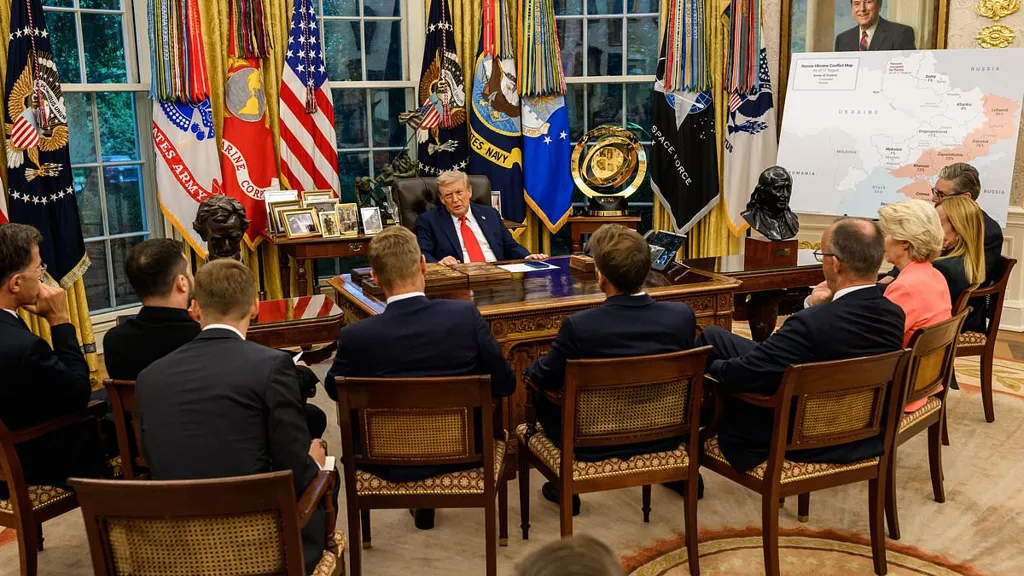The UK's top military chief is set to hold meetings in Washington DC today following Donald Trump's promise of security guarantees for Ukraine.
Sir Tony Radakin, the chief of the defence staff, is expected to attend talks at the Pentagon to thrash out how Ukraine would be defended from future attack in the event of a peace deal with Russia.
It follows crunch talks at the White House on Monday between the US President and European leaders, including Prime Minister Sir Keir Starmer and Ukraine's Volodymyr Zelensky.
After the emergency summit in the Oval Office - held in the wake of Mr Trump's talks with Russia's Vladimir Putin in Alaska last week - Sir Keir said there had been a 'common understanding' about a NATO-style security guarantee for Ukraine.
The PM added this was an 'Article 5-like guarantee', which could mirror the 'collective defence' clause of the NATO treaty that states that an attack against one NATO ally is considered an attack against all NATO allies.
Sir Keir has pledged to put British troops on the ground in Ukraine as part of efforts by the so-called 'coalition of the willing' of Ukrainian allies to help ensure a potential peace agreement with Russia holds.
But, during the Pentagon talks on Wednesday between military chiefs from the coalition of the willing and their American counterparts, Sir Tony is expected to state that UK peacekeeping troops would not be on the frontline with Russia.
US President Donald Trump told Ukraine's Volodymyr Zelensky on Monday that America would help guarantee Ukraine's security in a deal with Russia.
Mr Trump and European leaders, including Mr Zelensky and PM Sir Keir Starmer, met in the Oval Office on Monday to discuss Ukraine's future.
A British official told The Guardian: 'Wednesday is a really important moment.
'Nothing happens in Washington without the President giving the green light, so Trump giving his support to security guarantees on Monday kickstarted a lot of activity.'
Another said Sir Tony would echo pledges made by Defence Secretary John Healey, who recently said Britain was willing to deploy troops to Ukraine 'to secure the safe skies, safe seas and to build the strength of the Ukrainian forces'.
They added that ministers envisaged this as meaning logistical and training support rather than sending battalions of frontline troops who could end up in combat.
Security minister Dan Jarvis this morning said the flurry of diplomatic talks in recent days had 'brought the prospect of peace much closer' in Ukraine.
Speaking on Times Radio, he said: 'We've always strongly supported Ukraine's integration, both in terms of their potential desire to be members of the European Union and membership of NATO.'
'We don't think that any limitation should be placed on Ukraine's armed forces or on its co-operation with third countries, and Russia certainly shouldn't be able to have a veto against Ukraine's pathway to the European Union or NATO.'
Mr Jarvis added: 'I think it is important to make the point that very significant progress has been made.'
'I think the Alaska summit and the talks in Washington over the previous days have brought the prospect of peace much closer than they had been previously.'
But, despite the growing hopes that the three year-long conflict in Ukraine could soon be brought to an end, former Russian prime minister Mikhail Kasyanov warned that Mr Putin is 'absolutely not' ready for peace.
He told Times Radio that the Russian leader was 'absolutely not' serious about striking a peace deal, despite Mr Trump's suggestion trilateral meeting - potentially in Budapest - between himself, Mr Putin and Mr Zelensky.
'He doesn't want to have the high-level meeting. He doesn't want to meet to sit down with Zelensky,' Mr Kasyanov, a leading Putin critic, said.
'It will be some of a humiliating event for him. That's why he will be avoiding it. You're correct that the ball is on Putin's court, but he will continue dragging out time, continue his offensive operation, believing that he will win the war of attrition.
'He simply managed to avoid imposing just tough sanctions as a result of Alaska meeting.'
